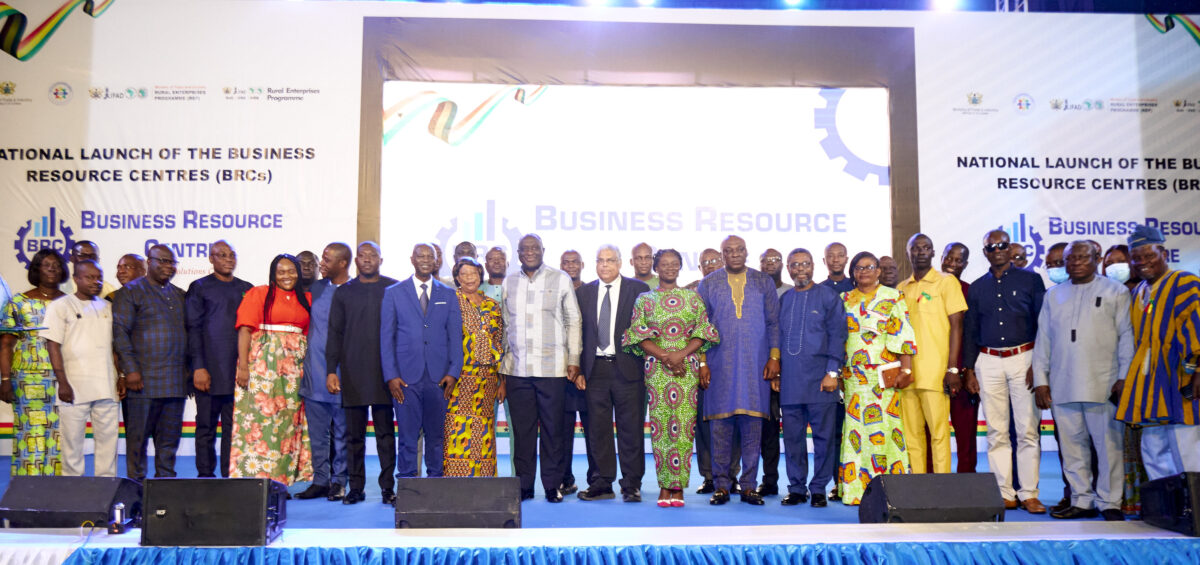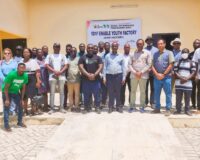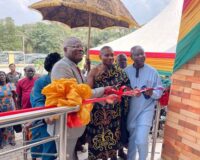The Minister for Trade and Industry, Mr Alan Kyerematen has launched the establishment of Business Resource Centres (BRCs) across the country in furtherance of Ghana’s industrialisation agenda. The BRCs are being set up by the Ministry of Trade and Industry, through the Rural Enterprises Programme (REP), to support the growth and competitiveness of micro, small and medium enterprises (MSMEs) and One-District, One-Factory (1D1F) companies.
The BRCs are providing business development services such as the identification of business opportunities, business plan preparation, facilitation of access to finance/credit and business health checks, otherwise known as business diagnostics. Other services include the provision of training in management and entrepreneurship, business counselling and advisory services, productivity improvement programmes and capacity building for institutions.
The establishment of the BRCs was funded by the International Fund for Agricultural Development and the African Development Bank (AfDB) through the Rural Enterprises Programme (REP).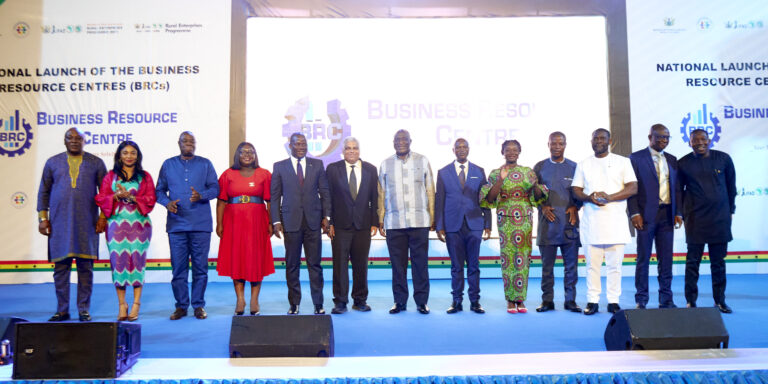
Need to develop the MSME sector of the country
Speaking at the launch of the BRCs in Accra yesterday, Mr Alan Kyerematen said the key to transforming the country did not lie in natural resources endowment but in taking advantage of the human capital and unleashing the entrepreneurial spirit of the population.
“The great nations of this world are not where they are because of their natural resource endowments. If that were the case, countries like Singapore and South Korea would be the poorest countries in the world and Africa would be the richest,” he said.
“Those countries are great because of their commitment to the development of entrepreneurs. There are companies that make annual turnover larger than Ghana’s Gross Domestic Product,” he added.
He observed that Ghana was faced with three main challenges, namely: unemployment, low revenue mobilisation and lack of sustained inflow of foreign exchange, which hindered its economic transformation. He explained that addressing those challenges would require the transformation of the MSME sector to create jobs and help the country to derive optimum benefit from trade agreements that allowed the country to export its products under free quota and duty-free.
Mr Kyerematen explained that it was against that backdrop that the ministry had, since 2017, been implementing a comprehensive industrial transformation programme to make the country the new manufacturing hub in Africa. He explained that it was against this backdrop that the Government re-aligned REP to provide comprehensive support for MSMEs and the 1D1F initiative.
Mr Kyerematen said about 80 per cent of employment generated in the country came from MSMEs and, therefore, appealed to the Ministry of Finance and the Bank of Ghana to put together a no-guarantee scheme that would ease liquidity in the banks to support the development of MSMEs.
IFAD and AfDB’s Support to the BRC Concept
In his remarks, the Country Director for the International Fund for Agricultural Development (IFAD), Hani Abdelkader Elsadani, indicated that the provision of business development services is key in helping the entrepreneurial poor to respond to the livelihood opportunities in their communities and provide them with the information and knowledge to make right decisions and investments that promote their economic activities. He mentioned that it was in this regard that IFAD is in full support of the BRC initiative as a one-stop-shop centre for MSME promotion at the district level.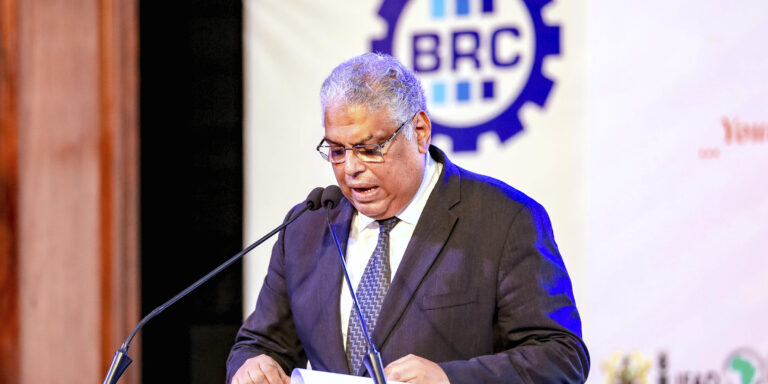
He added that the BRC concept introduced in Ghana is novel and provides an excellent learning opportunity in the sub-region and other regions, particularly on its franchising concept and private sector participation in what traditionally has always been a public sector domain.
Speaking on behalf of the Country Manager of the African Development Bank (AfDB), the Senior Transport Engineer at the AfDB, Sheila Enyonam Akyea, said the establishment of the BRCs was in line with the bank’s policy of helping to develop the rural areas. She expressed strong optimism that the BRCs would go a long way to support youth and female-owned businesses and develop the skill set required for the 1D1F initiative.
She lauded the Government and management of REP for the effective and efficient utilization of the resources provided by the AfDBs Akyea towards the implementation of the REP.
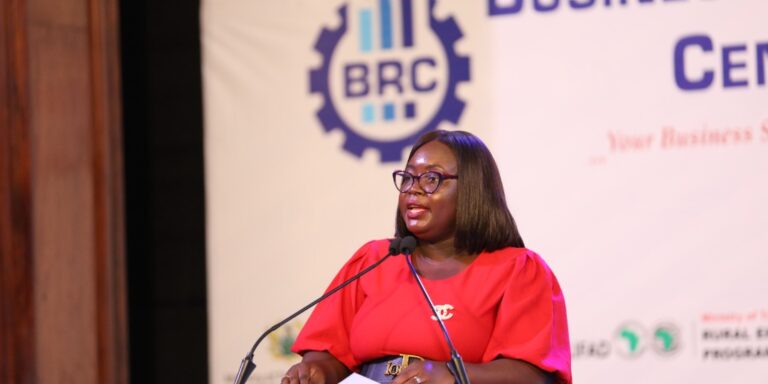 The Concept of BRCs
The Concept of BRCs
The National Director of the REP, Kwasi Attah-Antwi, explained that one unique feature of the BRC concept is its private sector management, under a Franchising arrangement with the Ghana Enterprises Agency (GEA) as the Franchisor and the private sector operators as franchisees. “This arrangement is to ensure the sustainability of operations and maintenance of facilities of the BRCs, and also aggressive and guided promotion of business activities in the country”, he said.
Mr Attah-Antwi mentioned that 37 BRCs have been in operations since August 2020 while an additional 30 are at various stages, earmarked for completion this year. He explained that the BRCs have very well-furnished and state-of-the-art buildings that comprise facilities such as reception areas, offices for staff, business centres/cafés, conference/training rooms, small meeting rooms and showrooms. All BRCs are connected to standby generators, solar power and boreholes and equipped with information and communications technology (ICT) equipment to support information and communication processes.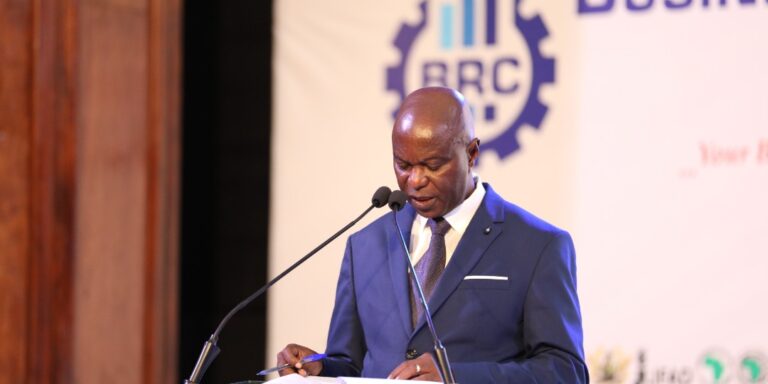
He reported that the achievement recorded for the transitional period operated by the first 37 BRCs since August 2020, indicates that the BRCs are indeed poised to make a difference in the business development services delivery arena in the country. BRCs have already registered and provided support to over 20,000 MSME firms and generated.
He mentioned that the Ministry of Trade and Industry, GEA and REP have finalised the legal, regulatory and institutional structures for the operations of the BRCs and are also providing the necessary technical backstopping to ensure smooth operations for the BRCs.
GEA’s Pledge as Franchisor
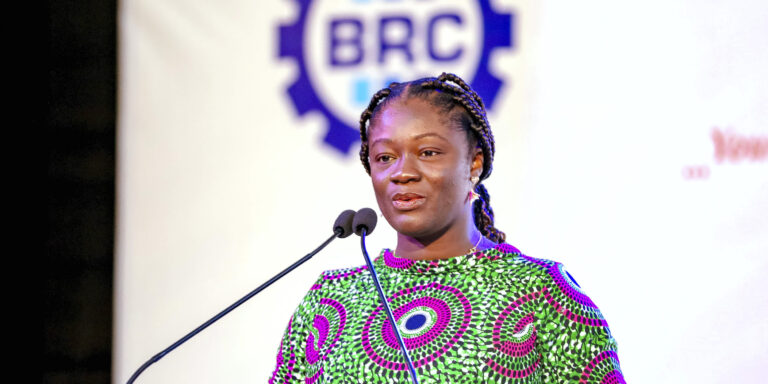 The Chief Executive Officer of the GEA, Mrs Kosi Yankey-Ayeh, described the BRCs as huge assets for the nation’s growth and development. She explained that the centres would provide quality direct implementation support for MSMEs in the country, which would, in turn, drive the economy and make it more sustainable and resilient. Mrs Yankey-Ayeh further pledged that the GEA, in undertaking its supervisory role over the BRCs, would ensure that the requisite tools to function were provided as expected.
The Chief Executive Officer of the GEA, Mrs Kosi Yankey-Ayeh, described the BRCs as huge assets for the nation’s growth and development. She explained that the centres would provide quality direct implementation support for MSMEs in the country, which would, in turn, drive the economy and make it more sustainable and resilient. Mrs Yankey-Ayeh further pledged that the GEA, in undertaking its supervisory role over the BRCs, would ensure that the requisite tools to function were provided as expected.


